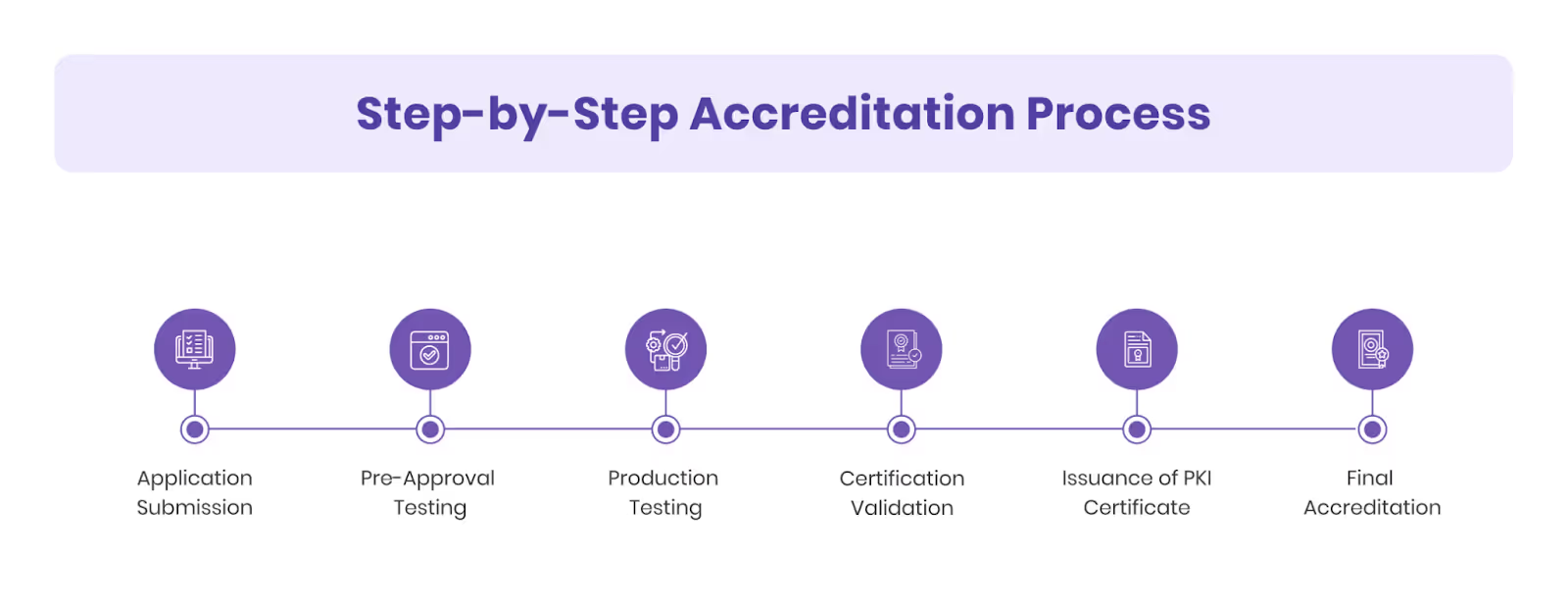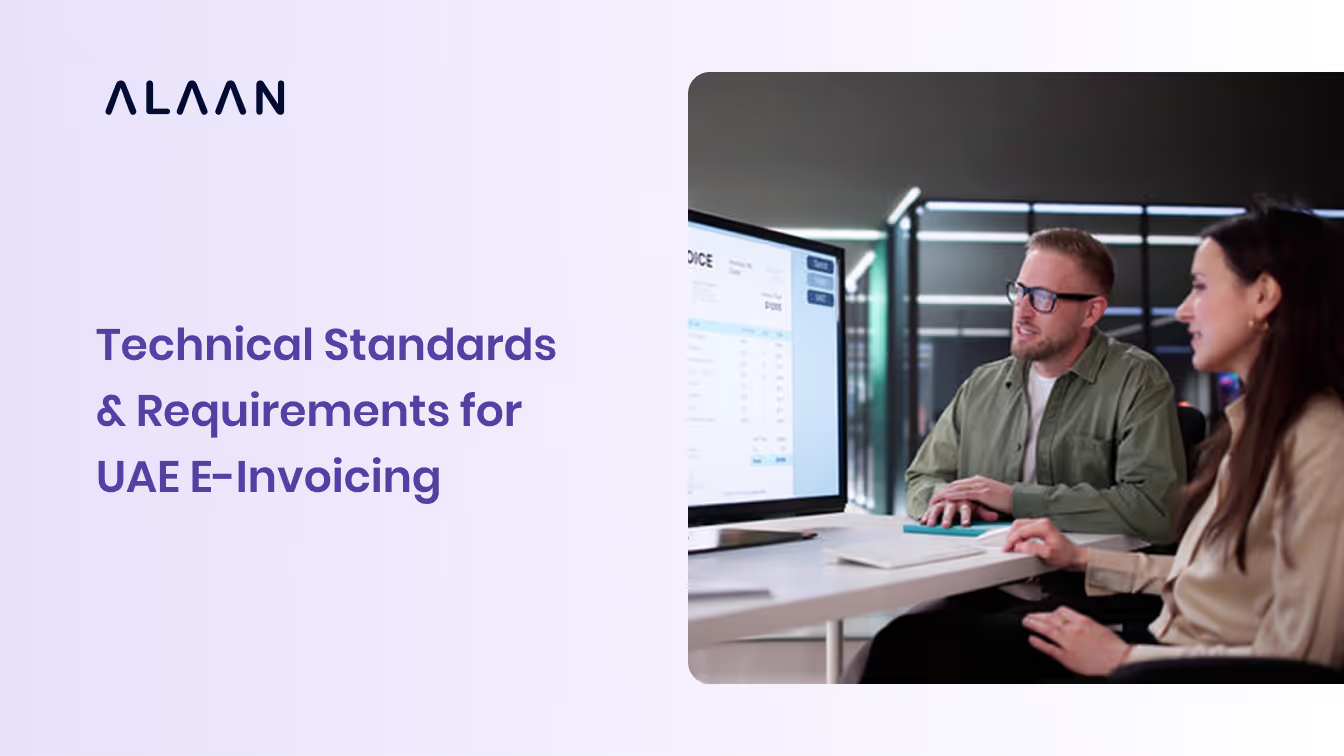E-invoicing in the UAE is evolving into a comprehensive technical requirement: by July 2026, structured electronic invoicing will be compulsory for all VAT-registered businesses conducting B2B and B2G transactions. To comply, organizations must align with specific standards for invoice formats, transmission protocols, and provider requirements.
This blog provides a clear and practical breakdown of:
- Mandatory invoice format (PINT AE XML)
- Secure exchange models and infrastructure (Peppol 5-corner)
- Technical and security certifications for Service Providers
- Integration expectations via APIs
Geared toward finance and IT teams, this guide will help you assess your systems and ensure readiness ahead of the mandate.
PINT AE: Required Invoice Format for Compliance
UAE e-invoices must be machine-readable XML documents structured according to the PINT AE standard—a localized version of the Peppol International (PINT) model.
Official Specification Release
On 19 June 2025, the UAE Ministry of Finance officially released the PINT AE specifications, detailing invoice structure, mandatory fields, and validation logic. These include document types (e.g., commercial invoices, credit notes, self-billed) and key data fields such as TRNs, VAT breakdown, supply classifications (free zone, reverse charge, etc.)
The Peppol governing body also published the PINT AE documentation, confirming Peppol compliance and providing schema definitions, code lists, and syntactic rules.
What This Means for Businesses
- Invoices must be generated in PINT AE XML format to be compliant—formats like PDF or scanned images are not acceptable.
- Key data fields required include clear TRNs, invoice number, issue date, amounts, VAT breakdown, and tax classification.
- Businesses should audit their ERP or billing systems to ensure they:
- Capture the required PINT AE fields
- Can export compatible XML files
- Are prepared to integrate with an accredited service provider (ASP) capable of final validation and transmission
Peppol & the 5-Corner Model: The Transmission Framework
The UAE has adopted the Peppol framework for e-invoicing, using a 5-corner model to ensure invoices are exchanged securely and in a standardized way. This approach eliminates the need for a single government portal and instead relies on interoperability across accredited service providers.
How the 5-Corner Model Works
In the UAE model, an electronic invoice flows through five key participants:
- Supplier (Corner 1) – Generates the invoice in XML format.
- Supplier’s Accredited Service Provider (Corner 2) – Validates and transmits the invoice into the Peppol network.
- Buyer’s Accredited Service Provider (Corner 3) – Receives the invoice, validates it, and delivers it to the buyer.
- Buyer (Corner 4) – Accepts the invoice in a compliant format and integrates it into their system.
- Federal Tax Authority / Ministry of Finance (Corner 5) – Receives tax data in real time, ensuring compliance and oversight.
Why the 5-Corner Model Matters
- Decentralized compliance: Unlike centralized clearance systems, this model allows businesses to connect via accredited providers without submitting directly to a government portal.
- Global interoperability: Any business connected to Peppol in the UAE can exchange compliant invoices with buyers worldwide.
- Validation and tracking: At each stage, acknowledgments known as Message Level Responses (MLRs) confirm whether an invoice has been received, validated, or rejected. These digital receipts reduce disputes and improve audit readiness.
Implications for UAE Businesses
- Companies must ensure their ASP supports Peppol connectivity and can handle real-time acknowledgments.
- IT teams should test integrations early to verify that invoices sent from ERP systems are properly transformed and validated before reaching customers or the FTA.
- Finance teams should familiarize themselves with status messages to quickly identify and resolve rejected invoices.
Note: The adoption of Peppol is a strategic choice—it positions the UAE within a global interoperability framework already used across Europe and Asia, reducing the need for multiple integration standards.
Security and Data Protection Requirements for UAE E-Invoicing
The UAE e-invoicing system has been designed not only for standardization but also for security and trust. Every invoice exchanged must meet strict requirements that protect against fraud, tampering, and unauthorized access.
Digital Signatures and Hashing
Each e-invoice must include a digital signature or hash that verifies authenticity and ensures the document has not been altered after issuance. This mechanism creates a verifiable trail of integrity, which is critical for VAT audits and dispute resolution.
Encryption in Transmission
All invoice data exchanged through the Peppol 5-corner model must be encrypted during transmission. This prevents interception and protects confidential business and tax information from being exposed.
ISO Certification for Accredited Service Providers
Service providers connecting businesses to the Peppol network must demonstrate robust information security and continuity standards. Specifically, ASPs are required to hold:
- ISO/IEC 27001 – Information security management
- ISO 22301 – Business continuity management
These certifications ensure that ASPs not only protect sensitive tax data but also have systems in place to recover quickly in case of outages or cyber incidents.
User Access and Authentication Controls
Beyond provider obligations, accredited platforms must implement multi-factor authentication (MFA) and role-based access controls. This guarantees that only authorized individuals can issue or view invoices, reducing the risk of internal misuse.
Alignment with National Fraud Prevention Goals
By mandating encryption, signatures, and certification, the UAE aligns e-invoicing with its wider digital economy and fraud prevention objectives. For businesses, these measures mean greater trust in invoice validity and fewer disputes with trading partners or the FTA.
Becoming an Accredited Service Provider (ASP): Criteria and Process
Only Accredited Service Providers (ASPs) are authorized to transmit compliant e-invoices in the UAE. This accreditation ensures that providers meet stringent technical, security, and operational standards set by the Ministry of Finance (MoF). For businesses, selecting an ASP from the official list is essential to ensure invoices are valid and accepted by the Federal Tax Authority (FTA).
Eligibility Criteria
To qualify for accreditation, service providers must meet requirements covering technical capability, security, compliance, and financial standing:
- Company Registration: Must be legally registered in the UAE with a minimum capital of AED 50,000.
- Experience: At least two years’ experience in e-invoicing or related digital services.
- Peppol Certification: Must be Peppol-certified and pass interoperability and conformance tests.
- ISO Standards: Hold ISO 27001 (information security) and ISO 22301 (business continuity).
- Insurance Coverage: Maintain professional indemnity and cyber risk insurance.
- Tax Compliance: Must be fully compliant with UAE tax obligations.
- Support for SMEs: Required to offer at least 100 free invoices per year for clients, supporting smaller businesses with compliance.
Accreditation Process

The process involves several stages of testing and approval before an ASP is added to the official register:
- Application Submission – Provider applies through the MoF portal with required documentation.
- Pre-Approval Testing – MoF conducts interoperability checks to confirm the provider can generate and transmit PINT AE invoices.
- Production Testing – End-to-end testing of invoice creation, transmission through the 5-corner model, and reporting to the FTA.
- Security & Certification Validation – Verification of ISO certificates, insurance, and compliance status.
- Issuance of PKI Certificate – Provider receives a Peppol Public Key Infrastructure (PKI) certificate to authenticate transactions.
- Final Accreditation – ASP is granted a two-year accreditation, after which it must apply for renewal.
Official List of ASPs
The MoF maintains a public register of accredited providers, which businesses should consult before integrating their systems. This ensures that invoices transmitted via the provider are recognized and compliant.
Practical Note for Businesses: Do not onboard a provider that is not listed on the MoF register. Invoices issued via non-accredited channels risk being rejected for VAT recovery, exposing businesses to penalties and compliance risks.
Integration & API Specifications: Connecting Business Systems to the FTA
For businesses, compliance is not only about invoice formats but also about how those invoices are transmitted to the Federal Tax Authority (FTA). Accredited Service Providers (ASPs) act as the bridge between a company’s internal finance systems and the UAE’s e-invoicing infrastructure.
Secure API Connectivity
ASPs integrate with the FTA through secure APIs and Peppol AS4 protocols, enabling:
- Submission of Tax Data Documents (TDDs): A structured summary of the invoice is sent to the FTA in parallel with the buyer receiving their copy.
- Status Acknowledgments: Businesses receive real-time updates confirming whether invoices were validated, rejected, or flagged for correction.
ERP and Accounting System Integration
Most companies will rely on their ERP, billing, or accounting software to generate invoices in the required XML format. To prepare, IT and finance teams should:
- Map internal invoice data (customer info, TRN, VAT breakdowns, payment terms) to PINT AE fields.
- Ensure ERP systems can export XML or integrate with an ASP to automatically generate compliant files.
- Test workflows early to ensure invoices flow smoothly from ERP → ASP → Peppol → Buyer → FTA.
Unique Invoice References & Timestamping
Every e-invoice must include:
- A unique invoice reference number to prevent duplication.
- A timestamp marking the exact issuance and transmission time.
These elements are vital for audit trails and real-time oversight by the FTA.
Archiving & Retention Requirements
Invoices must be stored in an electronic, retrievable format for the legally required period:
- 5 years for standard VAT records.
- 10 years for capital asset invoices.
- Up to 15 years for certain real estate-related records (until clarified further by MoF/FTA).
ASPs may provide built-in archiving, but businesses remain legally responsible for ensuring records are maintained correctly.
Practical takeaway: Businesses should not assume ASPs alone will handle integration. Internal IT and finance teams must align early to test APIs, validate ERP mappings, and confirm retention policies.
Key Takeaways: UAE E-Invoicing Technical Standards
For busy finance leaders and IT teams, here are the essentials to remember:
- Mandatory XML format: Only invoices issued in PINT AE XML will be compliant. PDFs or scanned images will not be accepted.
- Decentralized exchange model: Invoices must flow through the Peppol 5-corner model via an accredited service provider (ASP), not uploaded directly to an FTA portal.
- Strict security standards: Digital signatures, encryption, and ISO 27001/22301 certification are mandatory for ASPs, ensuring data confidentiality and integrity.
- ASP accreditation is critical: Only MoF-approved providers can legally transmit compliant invoices. Always verify against the official MoF register.
- API integration required: Businesses must ensure ERP/accounting systems can map invoice data to PINT AE fields, generate XML, and transmit via ASPs with full acknowledgment tracking.
- Archiving obligations: Invoices must be stored electronically for at least 5 years (longer for capital assets and real estate). Businesses remain responsible, even if ASPs provide archiving.
Compliance is not just about the invoice format — it’s about secure networks, accredited providers, and system readiness. Preparing now reduces risk and ensures smooth adoption ahead of July 2026.
Resources for Finance & IT Teams
To help you move from planning to implementation, here are official and high-authority resources you can rely on:
- PINT AE Specifications (XML Schema & Rules):
The official Peppol documentation for UAE e-invoicing, including PINT AE Billing 3.0 and Self-Billing standards.
docs.peppol.eu – PINT AE - MoF Accreditation Guide for ASPs:
Full eligibility criteria and accreditation process, including ISO standards, insurance requirements, and testing procedures.
UAE Ministry of Finance – E-Invoicing - List of Accredited Service Providers:
Always verify your provider here before integration to ensure compliance.
MoF UAE – Official ASP Register - Sample XML Invoice (Annotated):
A developer resource showing the required PINT AE elements, validation rules, and code lists.
OpenPeppol Example Files - FTA VAT Law & Record Retention Requirements:
Guidance on electronic storage obligations, retention periods, and compliance responsibilities.
UAE Ministry of Finance – VAT Guidance
Tip: Bookmark both the MoF portal and the Peppol documentation hub. Regulations and technical standards are updated periodically — staying informed reduces the risk of last-minute non-compliance.
How Alaan Supports Technical Compliance
Meeting the UAE’s e-invoicing standards requires more than awareness of the rules — it requires systems that are secure, interoperable, and audit-ready. Alaan’s spend management platform is designed to align with these requirements, helping finance teams achieve compliance without adding complexity.
Alaan’s Role in Supporting E-Invoicing Readiness
- PINT AE Alignment
Alaan integrates seamlessly with accounting systems to capture all required invoice data fields (supplier TRN, VAT breakdowns, invoice IDs, timestamps) so that every document is ready for PINT AE XML conversion through an accredited provider. - Accredited ASP Integration
Instead of businesses having to build and manage custom integrations, Alaan connects workflows directly to MoF-accredited ASPs. This ensures that invoices are validated, transmitted, and reported correctly through the Peppol 5-corner model. - Security and Compliance Controls
The platform enforces strong internal controls with role-based access, audit logs, and multi-factor authentication. Combined with accredited ASPs’ ISO 27001/22301 certifications, this gives businesses full compliance confidence. - Automation of Compliance Workflows
Manual checks increase the risk of errors that could lead to rejected invoices. Alaan automates compliance validations and provides finance teams with real-time monitoring of invoice transmission status, reducing operational risk. - Record Keeping and Audit Trail
Invoices, approvals, and expense data are automatically archived in line with UAE VAT retention requirements, ensuring quick retrieval during audits.
[cta-6]
With Alaan, compliance with UAE e-invoicing rules becomes part of your everyday finance operations — not a separate project or burden.
Conclusion
The UAE’s e-invoicing mandate is not only a regulatory shift but a technical transformation that touches every aspect of finance and IT operations. From generating invoices in PINT AE XML format, to transmitting them securely through the Peppol 5-corner model, to relying on MoF-accredited providers for compliance — businesses must ensure every link in their invoicing chain is aligned.
Preparing now is critical. By the July 2026 deadline, businesses that have already integrated with accredited ASPs, tested their ERP mappings, and trained finance teams will transition smoothly. Those who delay risk rejected invoices, VAT recovery issues, and significant penalties.
At Alaan, we believe compliance should empower finance teams rather than burden them. Our platform integrates with accounting systems, automates compliance checks, and connects businesses with accredited providers — making e-invoicing compliance seamless, secure, and future-proof.
Don’t wait until enforcement begins. The window to prepare is open now.
Book a demo with Alaan and see how our platform simplifies UAE e-invoicing compliance while giving your business the tools to manage spend smarter and more efficiently.
Frequently Asked Questions (FAQs) on UAE E-Invoicing Technical Standards
1. What is PINT AE in UAE e-invoicing?
PINT AE is the official XML invoice format mandated by the UAE. It is based on the international Peppol standard (PINT) but adapted to include UAE-specific requirements such as supplier and buyer TRNs, VAT breakdowns, and free-zone indicators. From July 2026, only invoices issued in this format will be compliant.
2. Can I still issue invoices in PDF or paper format?
No. While PDFs and paper invoices may still be used for some B2C transactions initially, all B2B and B2G invoices must be issued electronically in PINT AE XML. Non-compliant invoices may be rejected and could invalidate VAT recovery.
3. What is the Peppol 5-corner model?
The 5-corner model is the framework adopted by the UAE for transmitting invoices. It connects suppliers and buyers through their respective Accredited Service Providers (ASPs), while also reporting data to the FTA in real time. This ensures security, interoperability, and auditability across the system.
4. Who are Accredited Service Providers (ASPs)?
ASPs are MoF-approved intermediaries authorized to transmit e-invoices. They must meet strict criteria, including Peppol certification, ISO 27001 and 22301 compliance, and offering 100 free invoices annually to support SMEs. Only ASPs on the official MoF register are authorized to connect businesses to the FTA.
5. Do I need to upgrade my ERP system for compliance?
In most cases, yes. Your ERP or billing system must be able to capture all required invoice fields (as per PINT AE) and export them in XML, either directly or through integration with an ASP. Early testing with your provider is strongly recommended.
6. How long must I store electronic invoices?
VAT law requires electronic invoices to be retained for at least 5 years (longer for capital assets and real estate). Even if your ASP provides archiving, your business remains legally responsible for ensuring proper storage.


.avif)







